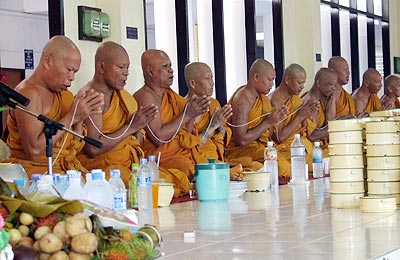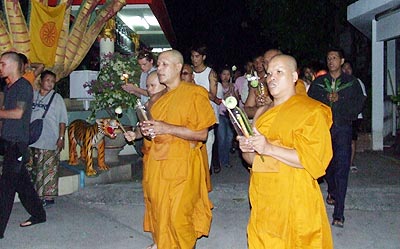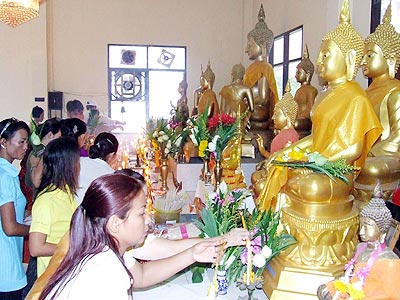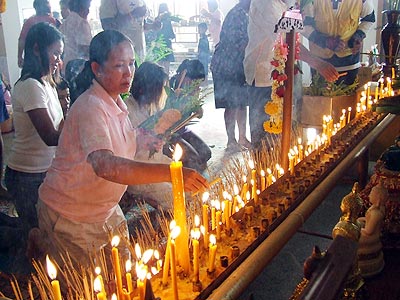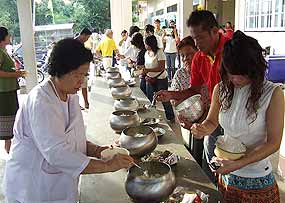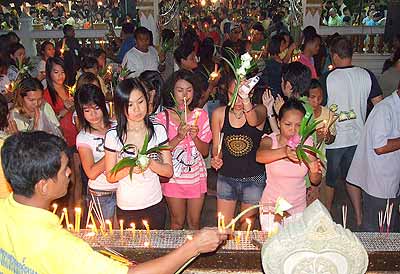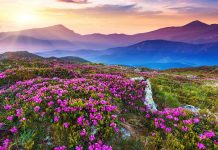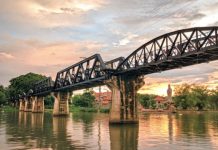Banks and government offices closed
Tuesday, May 17, is one of the most venerated holidays on the Buddhist calendar: Visakha Bucha Day. This Buddhist Holy Day marks the beginning of the Buddhist Era 2,554 years ago, and celebrates the miracle of the Buddha being born, reaching enlightenment and passing away and achieving final release from the circle of rebirth or Nirvana, all on the same date.
Devout Buddhists participate in ceremonies at nearby temples, making merit in the morning by bringing alms to monks and listening to sermons. Later this evening devotees will continue assembling at temples to conduct the “Wien Thien” ceremony, walking around sacred temple grounds three times holding candles, joss sticks and flowers honoring the Buddha, the Dharma (Buddha’s teachings) and the Sangha (the Buddhist Monastic Order).
Worshipers are in calm and meditative state as they remember Buddha’s compassion and his teaching on evil and righteousness. After the walk, people sit to listen to the Dharma preached by monks and receive sprinkled blessing of holy water for good fortune.
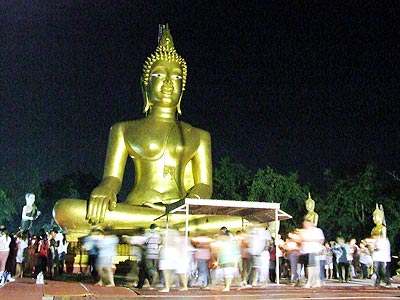
Visakha Bucha means the worship of the Buddha on the day of the full moon in the sixth lunar month, which usually falls in May. Sri Lanka proposed to the UNESCO meeting on December 15, 1999, that Visakha Bucha Day be recognized as the most important memorial day in Buddhism and marked as a “World Heritage Day”. Thailand, which is the permanent location of the World Fellowship of Buddhists, was chosen to always host and celebrate this day.
For this holiday, killing any kind of animal and drinking alcohol or intoxicating substances is forbidden for 3 days. Wats are to be adorned with lanterns, flowers and joss sticks as symbols of worship, and fireworks will be lit for three days to celebrate.
Banks and government offices are closed for this holiday. Although not mandatory, the government is asking that no alcohol be served on this day, and that all bars and entertainment venues close for 1 day. An unnamed police spokesman told Pattaya Mail that police will strictly enforce this “request”.
Additional Report:
Strict control over the sales of alcohol is imposed tonight
BANGKOK, 16 May 2011 (NNT)-The Department of Disease Control in collaboration with the police will visit stores across the country to make sure no alcohol is sold on Visakha Bucha Day. Fines will be immediately made on the spot if any stores are found in violation of the rule.
Dr Saman Futrakul, Director of the Disease Control Department’s Office of Alcohol Beverage and Tobacco Consumption Control Committee, said minimarts, shopping malls and grocery shops can expect a visit from the authorities tonight. According to the Alcohol Act 2008, no alcoholic drinks should be sold on this religious day on any venues except hotels. The law will come into effect starting from Monday midnight until the end of tomorrow.
Violators could face a jail term of no more than 6 months or a maximum fine of 10,000 THB or both. However, sellers of alcoholic beverages could be charged later if no police are accompanying the officials from the Disease Control Department.
Historical Background:
The Buddha was a king by birth. His clan name was Gotama. He was born in Sakya Kingdom, eighty years before the Buddhist Era (around 2625 year ago), at Lumbini Park (now called Rummindel, in Nepal, north of India), in Madhayama Pradesa, located between Kapilavastu, capital of the Sakya Kingdom and Devadaha, capital of the Koliya Kingdom, on Friday, the Vesak full moon day in the year of the dog.
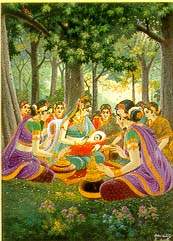
Prince Siddhatha (the Buddha’s personal name) was the son of King Suddhodana and Queen Sirimahamaya. On his birthday, Queen Sirimahamaya who was pregnant, wanted to pay a visit to Devadaha wich was her native country.
In the morning of the Vesak Full moon day, the Queen left Kapilavastu on a visit to Devadaha. Approaching a lovely park of Sals trees called Lumbini, located between the two capitals but nearer to Devadaha, the Queen wanted to visit the park and when she arrived at a Sal tree she started contractions and gave birth to a son there. When the Kings of Kapilavastu and Devadaha learned this, they were very happy and arranged a procession back to Kapilavastu.
Prince Siddhatta was brought up in the midst of luxury, led the happy life of a privileged youth and married at the age of 16 to Princess Yasodhara or Bimba who bore him a son, Rahula.
He discontened and took on the life of a wandering ascetic a the bank of the Anoma River. He was then 29.
He studied the mystic practices of the foremost Brahmin ascetics and realized that such practices were not the way to enlightenment. He went on his own way applying the reflective thought of conscious meditation to a rational simple life of moderation.
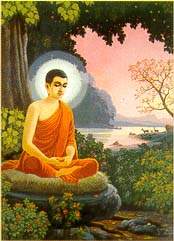
At the age of 35, he attained Enlightenment at Uruvelasenanigama subdistrict, Magadha State, (nowadays, located in the area of Buddha Kaya, Bihar State, India), on Wednesday, the Vesak Full moon day, the year of the cock, forty five years before the Buddhist Era.
The Dhamma discovered by the Buddha was Ariyasacca or the Four Noble Truths, namely:
The Noble Truth of Suffering
The Noble Truth of the Origin of Suffering
The Noble Truth of the Extinction of Suffering
The Noble Truth of the Path leading to the Extinction of Suffering
After having attained Enlightenment, the Buddha wandered from place to place teaching his discoveries to people who are accessible to instruction, helping large numbers of them achieve various levels of spiritual attainment. He sent his followers to spread Buddhism in capitals, cities and upcountry, until Buddhism was firmly established and widely spread.
The Buddha passed away on Tuesday, the Vesak full moon day in the year of the small snake under the two Sal trees in the Sala Grove of the Mallas in Kusinara, capital of the Malla State, (nowadays located in Kusinagara of Uttrarapradesa, India) at the age of eighty.
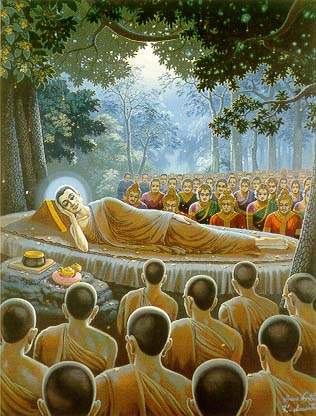
The performance of the rituals on Visakha Bucha day had been continuously observed in Jambudavipa or India, the motherland of Buddhism, for a long time before Buddhism spread to Sri Lanka and Thailand. There, the Visakha worship has been continually observed to the present day.
In Thailand, Visakha Bucha observance began during the Sukhuthai period (around 700 years ago), because of the close religious relations between Thailand and Sri Lanka. Sri Lankan monks came to propagate Buddhism in Thailand and were highly respected. Thai monks also went to study in Sri Lanka. It’s believed that, those monks introduced this ceremony to the King and people at that time
Similar morning religious activities and evening ‘Wien Thien’ are seen at temples in Pattaya city, Banglamung and Jomtien, and around the nation.
